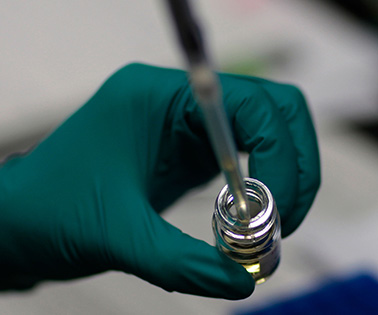October 18, 2021
Vaccines Security in Africa – Which Way Next?
IAVI and African Vaccine Manufacturing Initiative host virtual forum.
 Credit: Getty Images
Credit: Getty Images
Which continent represents 14% of the world’s population but only 0.1% of the world’s vaccine production? The answer is: Africa. Fewer than 10 African countries are self-sufficient in vaccine procurement and most continue to rely on UNICEF and Gavi, the Vaccine Alliance, for the supply of routine vaccinations, totaling over 1.5 billion doses annually. This overreliance on external supplies amid the COVID-19 pandemic has further underscored the urgent need for locally produced and accessible vaccines as a public health security measure.
The pandemic has also spurred progress, led by African leaders’ recent pledge to increase the share of vaccines manufactured in Africa from 1% to 60% by 2040; a memorandum of understanding between the Coalition for Epidemic Preparedness Innovations and the African Union Commission to enhance vaccine R&D and manufacturing in Africa; and a World Health Organization (WHO) initiative to expand the capacity of low- and middle-income countries (LMICs) to produce COVID-19 vaccines. It is against this backdrop that IAVI and the African Vaccine Manufacturing Initiative (AVMI) hosted a virtual forum to unpack the vaccine development and manufacturing landscape in Africa on Aug. 26.
“Vaccines Security in Africa – Which Way Next?” brought together researchers, policymakers, pharmaceutical/biotech companies, civil society organizations, and the media to discuss and advocate for pathways toward a sustainable vaccine development and manufacturing ecosystem backed with sustainable financing, strategic partnerships, innovative financing approaches, and domestic resource mobilization. Forum participants also highlighted opportunities to accelerate vaccine development and manufacturing in Africa. Speakers included representatives of Africa Centres for Disease Control and Prevention (CDC), AVMI, IAVI, WHO, and WHO Regional office for Africa (WHO/AFRO).
Keynote speaker Dr. Lindiwe Makubalo, assistant regional director, WHO/AFRO, stated that now is not the time to ask for political will, but rather political action, leadership, and practical support aimed at accelerating sustainable access to vaccines on the continent. She noted that COVID-19 presents new opportunities for action in domestic vaccine manufacturing and reiterated WHO’s commitment to partnering with governments, policymakers, and regulators to support a sustainable market for locally produced vaccines.
“Establishing vaccine manufacturing capacity in Africa has emerged as the only sustainable solution that can guarantee security of vaccine supply in the fight against vaccine preventable diseases and also in the fight against pandemic diseases,” she said.
Dr. Nicaise Ndembi, chief science advisor, Africa CDC, unpacked the organization’s plans to accelerate vaccine production in Africa through strengthened human and institutional R&D capacity. Dr. Ndembi acknowledged the CDC’s existing enablers such as rich partnerships and reiterated the need for actors to make a business case for investments in vaccine R&D. On his part, Martin Friede, coordinator, Initiative for Vaccine Research Immunization, Vaccines and Biologicals Department, WHO, shared insights on the WHO’s recently established multilateral technology transfer hubs, which serve to accelerate vaccine manufacturing and supply in African and other LMICs. Providing perspectives on the WHO ‘hub and spoke’ technology transfer model, he further noted that WHO is currently supporting a South African consortium to establish the first COVID mRNA vaccine technology transfer hub. The technology transfer hubs are training facilities where the technology is established at industrial scale and clinical development performed. Interested manufacturers from LMICs can receive training and any necessary licenses to the technology, while WHO and partners bring in the production know-how, quality control, and necessary licenses to a single entity to facilitate a broad and rapid technology transfer to multiple recipients.
AVMI founding member and forum co-host Patrick Tippo drove the discussion on how to deal with infrastructural, regulatory, and market barriers to create an enabling environment for domestic vaccine production. He also highlighted the challenges and opportunities for regional manufacturing collaboration.
“To enable a vaccine manufacturing ecosystem in Africa, we must consider the workforce and the target market, just as much as the technology, equipment, and capacity. At the end of the day one size does not fit all,” he said.
Dr. Brenda Okech, director of Uganda Virus Research Institute-IAVI, called upon partners to duly focus on HIV prevention research (vaccines and monoclonal antibodies). She made the case for prioritizing HIV vaccine development in Africa, highlighting what it would take to bridge discovery research to vaccine manufacturing. She further underlined the mechanisms for adopting an end-to-end product development approach and shared the vision, capabilities, and opportunities of HIV vaccine development.
“Africa continues to bear the greatest burden of HIV/AIDS, and thus it only makes sense if the continent concentrated its efforts and investments towards eradicating the disease burden,” she said. “An HIV vaccine, if added to the current HIV prevention toolbox, will help us achieve the goal of ending the HIV/AIDS epidemic,” she added.
A Q&A session brought all the discussions together, highlighting the practical steps that can be taken in the next six months to realize the vision of vaccine manufacture in Africa. Outputs of this forum will feed into the development of a roadmap on the next steps in product development and manufacturing on the continent. The forum complements other ongoing discussions that seek to prompt Africa’s leaders toward ramping up capacity in vaccine manufacturing and boost the continent’s regulatory bodies for medicines.
Watch the recorded webinar here.